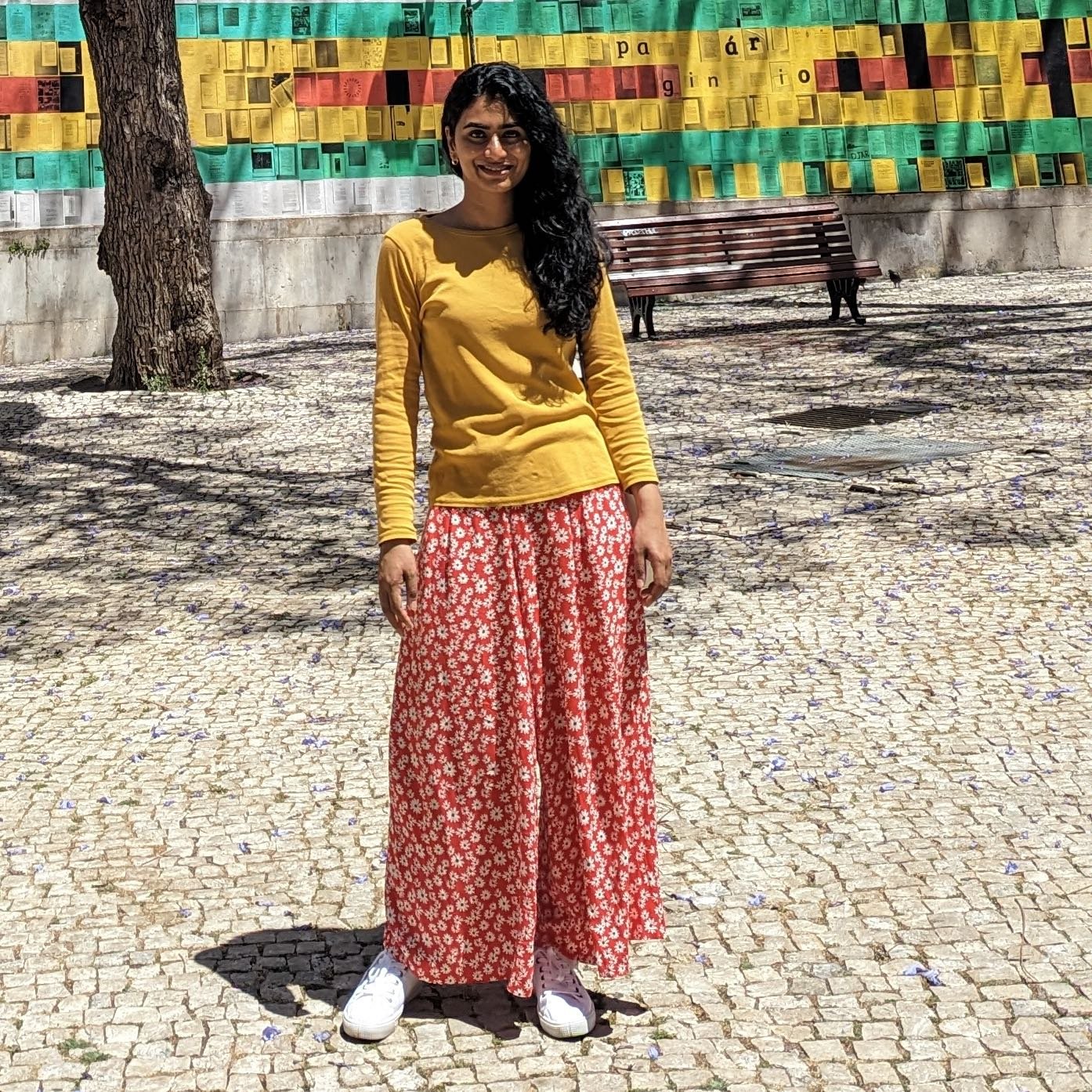Interview with Alexandra D’Sa – cast member of new play SILENCE exploring Partition
Words & INTERVIEW by Swetha Charles
Alexandra D'Sa, cast member of SILENCE by Tara Theatre
SILENCE, the new play from Tara Theatre, brings personal testimonies from Partition to life on stage – to break the silence. Swetha Charles interviews cast member Alexandra D’sa about her relationship to Partition and her thoughts on the play.
In August 1947, the partition of India to also create West and East Pakistan (now Bangladesh), drenched the subcontinent in violence, trauma, and exile. Some survived, many did not and some are here with us today, living across Britain. The breadth and depth of their stories have shaped, and continue to impact the lives they have built here. Yet, despite Partition’s wide reaching legacy there remains a hushed silence around Partition, both in the subcontinent and in Britain.
SILENCE, the new play from Tara Theatre, is a chance to hear the shared history of what happened so many years ago. The play has had a long birth. In the summer of 2017, Puri created the series “Partition Voices'', broadcast on Radio 4, to commemorate the 70th anniversary of Partition. The series brought together the personal eye witness accounts of those who survived the last days of the British Raj and who had gone on to create lives in Britain. These testimonies were collated in the book “Partition Voices” and it was from this book that SILENCE was adapted. In the book, Puri highlights the feeling of urgency when speaking to the survivors, the “sense that this could be the last big anniversary for many. It was their final chance to speak about that time”. Through the act of communal storytelling, SILENCE brings these personal testimonies to life on stage.
I asked Alexandra D’Sa, a cast member of SILENCE, on her relationship to Partition and her thoughts on the play.
SILENCE, Tara Theatre // Photo by Alex Lambert
Swetha: What first drew you to this project based on Partition?
Alexandra: In all honesty, I didn't know that much about it. I used to think that was because my family are Goan and were pretty removed from the conflict, both in terms of religion and location. But it's not just that is it? It's because it was so poorly handled, so traumatising, that nobody wants to talk about it - British or Indian. And what's more important, more necessary, than a story that has never been told? That's what drew me to the project. That, and the opportunity to work with Iqbal Khan.
I also recently lost two of my grandparents, and so there's something very powerful for me about finding a connection to them through working on this play.
Forgetting is also a privilege… doesn't mean we don't still live with the consequences
S: In Britain, there is a wilful amnesia that surrounds the legacy of Empire, the British Raj and the role Mountbatten played in carving up the subcontinent. What are your thoughts on this “forgetting”?
A: My response before doing this play would have been anger and frustration at the Empire not being taught at school or deconstructed, and instead being glamorised, and at the systemic ways contributions of South Asian people are devalued. But the more we explore the world of SILENCE, the more I realise that sometimes 'forgetting' is necessary. If you're moving to a new home, especially if you've been forced to move, forgetting can be a survival mechanism.
Forgetting is also a privilege. We are removed enough from a situation to be able to choose how we interact with it on a day to day basis, but forgetting doesn't mean we don't still live with the consequences of it. I'm only here because my grandparents chose to come here. In my family's situation, the reason was economic opportunity and the threat of a genocidal Idi Amin. But many others have a different story and that story is directly linked to Partition. Forgetting doesn't mean the effects don't still live with me, and us, every day.
There are definitely still legacies that the British left when they sailed out of India - a taboo of sex and gender. How many former British colonies still criminalise homosexuality because of the laws the British brought in? The legacy of Empire is a mix of all of that, everything from our attitudes to sex, to intergenerational trauma, to national debt, to cultural genocide. I don't think this deconstruction or this decolonisation is all systemic either. I think it starts with us, and being introspective about "truths'' and beliefs we've internalised.
even in the rehearsal room as actors when we were talking about where our families are from - there was this resounding desire to know more
S: Going on to Pakistan and India, the story of independence seems to overshadow the remembrance of the violence, betrayal and forced migration that followed Partition. How do you think characters in the play act to remind the audience of what happened in Partition and its reverberating impacts on the present?
A: The play shows different people in the UK today recounting their experience of Partition, and how they come to understand the impact of what happened nearly 80 years ago in (now) Pakistan and India. I use 'people' instead of 'characters' because these are REAL stories. They're not made up. So you can't escape the violence, even if you wanted to, in this play, because the truth of what happened is unimaginably violent. The play also invites audience members to understand their connection to this violence - even if they have no direct heritage in South Asia, there's still violence happening all over the world and playing out in front of our very eyes on social media at the moment. How do we feel about it? What are we doing about it? Are we trying to forget it, in real time, because we can? Are we ignoring that our governments fund some of this violence?
What's really interesting to me in the play is that in some scenes you've got people recounting the violence they saw in front of their children and grandchildren, who have never heard anything about it before. That's why the play is called SILENCE, right? Because of the silence that surrounds Partition from those who experienced it. So you've got younger generations, in real time, learning about the reverberating impact this violence has had on their lives. Stories that have been untold for years, patterns of behaviour or ways of communicating that they didn't understand are now becoming so much clearer because they know what their family members have been through. That's also what's so devastating, you can see this real desire to know our heritage - even in the rehearsal room as actors when we were talking about where our families are from - there was this resounding desire to know more. The fact that we don't know, is, I think, the legacy of Partition and forced migration.
S: Moving to the play - who is the intended audience in your mind? What do you hope audiences will take away?
A: I think everyone needs to see this play. I know that's a neat answer. But to be honest, if the British education doesn't cover these stories, people need to hear it somewhere.
Guilt has come up, guilt of not knowing as much as I know now, guilt for not understanding my family history as much as I should
S: In terms of your personal experience - embodying characters based on real people who have seen so much loss and violence must bring up difficult emotions as an actor. What emotions have come up for you as part of the play and what practices support you as you work with difficult material?
A: I actually play a couple of characters in the play who haven't been through the violence directly, but their ancestors have, so in a way, I'm slightly removed from that violence. There's trauma to deal with in other ways. And it's certainly a very emotionally difficult piece, especially rehearsing during a time where we are seeing such conflict (also with a religious component) happen before our eyes. Guilt has come up, guilt of not knowing as much as I know now, guilt for not understanding my family history as much as I should. Also a really interesting mix of guilt and validity of my own 'Britishness'. It's all a bit much for my brain and body to cope with at the end of the day! I swim, to move the characters out of my body and I find a bit more freedom in the water. I also listen to music on the way home after rehearsals, the music I would listen to with my grandparents. I said before that this piece is helping me connect with them and understand them a bit more, the music just helps me do that with a smile.
A lot of the time in life I don't feel 'Indian' enough, I don't speak a language apart from English, I'm Catholic…
S: Partition is sometimes seen as a story of people divided by religion. How do you connect with religion in your own life and does it affect your portrayal of the characters in the play?
A: I was born and raised a Catholic. When I came out as gay as a young teenager, I moved away from practising my faith, not feeling that I would be welcome in the Church. I sometimes go to Church now, on my terms. I pray every night. Religion to me means family. When I pray, I pray to my grandparents. When I go Church it reminds me of being 10 years old and going with my parents and brother. There's something comforting about the ritual. There's a character in the play who talks about 'soil being more precious than religion', and I think that's how I feel, too. I'd more put it as - who I surround myself with in life, and how I treat other people, is more precious to me than religion itself. Faith is different. Religion can, and has, been weaponised. Faith is something that we have for ourselves - or not.
S: Could you share your experience of rehearsals so far? How has it been working with South Asian actors and directors? Any memorable moments you can share with us?
A: I absolutely adore all of the cast and creatives on this show. I've had an amazing time. This is the first bit of theatre I've done in nearly a decade, it's been a lot of screen work for me in between, and I just love being back on stage and in the rehearsal room. I thought I'd feel out of place a little bit working on this play. A lot of the time in life I don't feel 'Indian' enough, I don't speak a language apart from English, I'm Catholic, etc, etc. But the diversity of South Asian experiences in the room is extraordinary, we're not all the same! Shocker! But there's something really affirming about people having similar experiences to you, to be honest, also working with people who look like you. That hardly ever happens. It feels like we've got each others' back.
In terms of memorable moments, we have a lot of really interesting use of fabric and lighting in this show and seeing that come to life for the first time was incredible. Come to the show to see what I mean!
SILENCE is touring across April in London, Birmingham, Leicester and Manchester. Book tickets here.
This interview has been edited and condensed for clarity.
About Swetha
Swetha Charles, originally from Chennai, India and Birmingham, UK is now based in North-West London where she lives with her cat. A software engineer by day, in her free time, she loves to read, garden and write.



